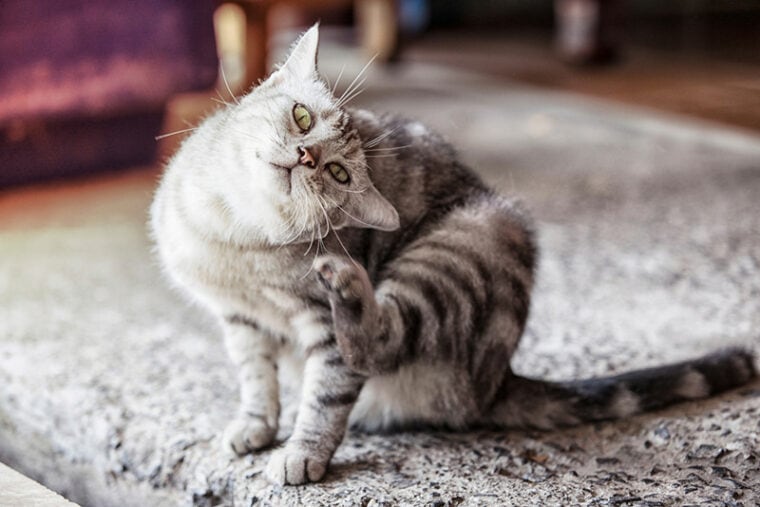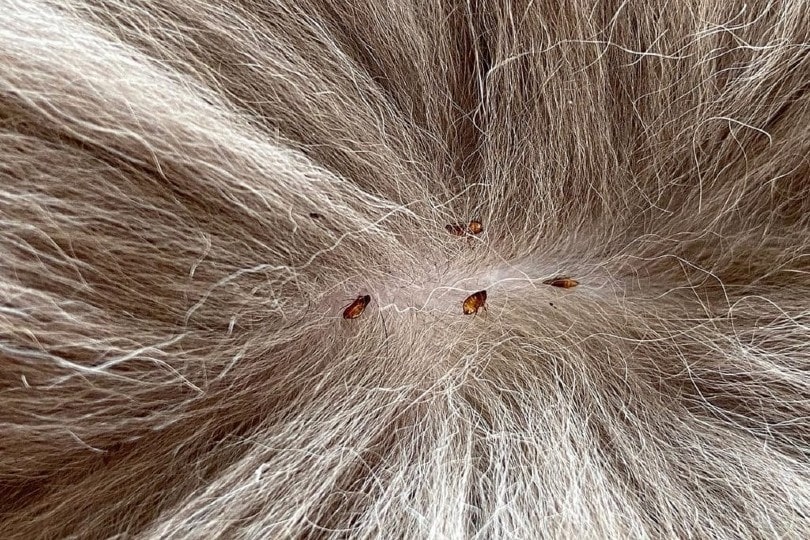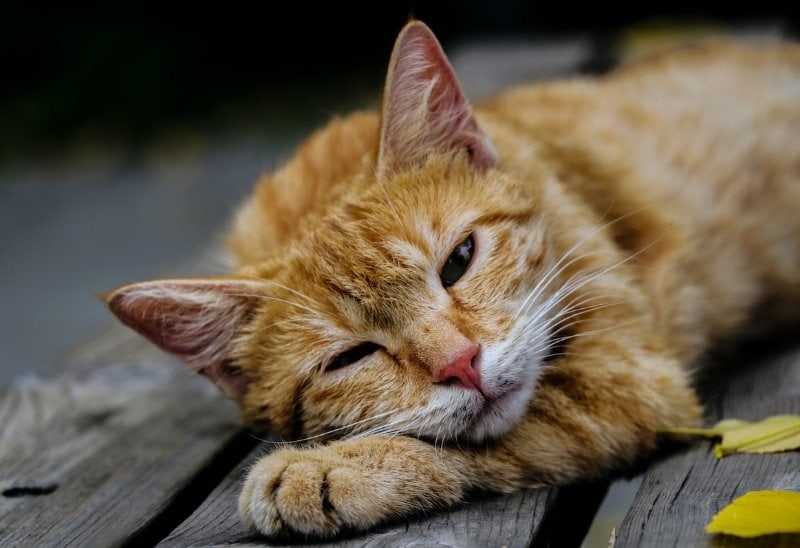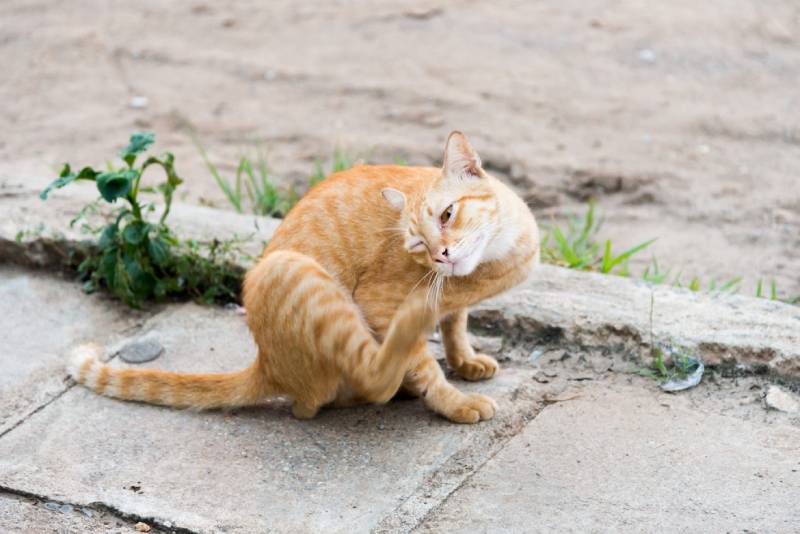
Fleas are a common nuisance for both cats and their owners. These tiny, blood-sucking parasites can cause not only discomfort and irritation to our feline companions but they also carry some diseases. While fleas are generally considered a nuisance, many cat owners wonder if they can pose a serious threat to their pet’s health. It begs the question, can cats die from fleas? To answer, yes, flea infestations that get out of hand can cause different illnesses that can be fatal for your cat.
We will explore the question about just how dangerous fleas are for cats, as well as discuss the potential risks and preventive measures to keep our furry friends safe and healthy!
What Are Fleas?
Fleas are small, wingless insects that belong to the order Siphonaptera. They are blood-sucking ectoparasites, meaning they live on the exterior of their hosts and feed on their blood. Fleas have a flattened body, which enables them to move quickly through an animal’s fur. They are capable of jumping impressive distances, allowing them to easily move between hosts.
Fleas are one of the most common external parasites not just for cats, but for other animals as well. Infestations from fleas can cause irritation, discomfort, and potential spread of diseases.

Can Cats Die From Fleas?
Fleas can contribute to several health issues that, if left untreated, may result in severe complications and even be life-threatening. Thankfully, cats dying from fleas is generally uncommon, but the health complications that cats with fleas are at risk of should still be properly managed to prevent any progression.
Which Conditions Can Cats Get From Fleas?
Some cats might seem as if they are completely unaffected by fleas, but still, fleas are notorious for spreading diseases that can put your and your cat’s health at risk. Whether it’s skin disease, blood loss, or the transmission of bacteria or parasites, here are a few medical conditions that are caused by fleas:
Anemia
Anemia is a condition characterized by a decrease in the number of red blood cells,1 which can lead to weakness, fatigue, decreased appetite, pale gums, a fast heart and breathing rate, and, depending on the degree, even organ failure. Fleas can be particularly dangerous for kittens, especially newborn kittens, and should be addressed promptly to avoid serious health complications.

Flea Allergy Dermatitis (FAD)
Some cats are hypersensitive to flea saliva, leading to an allergic reaction when bitten.2 This is the most common skin allergy in cats. Similar to other allergens, FAD can result in intense itching, hair loss, skin infections, and inflammation, causing pain and discomfort for your cat.
If FAD is not managed properly, it can lead to secondary infections or self-mutilation as the cat attempts to relieve the itching, not to mention the detrimental effects this has on your cat’s quality of life.
Tapeworm Infestation
Fleas serve as intermediate hosts for tapeworms.3 When a cat ingests a flea while grooming, they can become infected with tapeworms since fleas carry the larval stage. The parasite then continues its cycle and develops into an adult worm in the cat’s intestine. These parasites can cause weight loss, poor coat condition, and gastrointestinal disturbances.

Feline Infectious Anemia (Hemoplasmosis)
Fleas can transmit a group of bacteria known as mycoplasmas (or hemoplasmas),4 which can cause anemia in cats. The most important of these bacteria is Mycoplasma haemofelis. This bacteria mainly targets the cat’s red blood cells, contributing to its destruction and affecting its ability to carry oxygen to different parts of the body.

Can Fleas Cause Infections in People?
Fleas can carry and transmit bacteria called Bartonella,5 which can cause severe illness in people. This bacterial infection is called cat scratch disease, cat scratch fever or bartonellosis. Symptoms may include swelling and redness at the site of the scratch or bite, fever, headache, poor appetite, exhaustion, and swollen lymph nodes.
Can Fleas Kill a Kitten?
Yes, fleas can kill kittens. Newborn kittens are generally more vulnerable to the harmful effects of flea infestations. Fleas can cause anemia in kittens by consuming a significant amount of their blood and, due to their lower body weight, can prove fatal to the fragile kitten.
Signs That Your Cat Has Fleas
Detecting fleas on your cat may not always be straightforward, especially if they are skilled groomers. However, as cat parents, it is important to look out for certain signs that your cat may have fleas.

How Do Cats Catch Fleas?
Cats can catch fleas in various ways. The most common source of infestation is through contact with other infested animals, such as cats or dogs.
Fleas can easily jump from one host to another, so even a brief encounter with an infested animal can lead to a flea problem.
Additionally, fleas can be found in environments such as parks, gardens, or even inside your home. They can hitch a ride on your clothing or come in through open doors or windows. Therefore, even indoor cats can be at risk of getting fleas.
How to Prevent Your Cat from Catching Fleas
When it comes to protecting your cat from fleas, prevention is key. As responsible cat parents, there are a few steps you can take to prevent your cat from catching these pests.
Getting your cat regular flea prevention treatment is the best way to protect your cat. Consult with your veterinarian to determine the best flea prevention product for your cat. There are various options available, including topical treatments, oral medications, and flea collars. Follow the recommended dosage and application instructions and always protect yourself with gloves when applying the product.
Maintaining a clean environment is the next step to preventing flea infestations. Keep your living environment clean and vacuum regularly, especially in areas where your cat spends most of its time. Washing your cat’s bedding and any fabric surfaces they frequently come into contact with can help remove fleas and their eggs.
In addition, the use of flea control products specifically designed for your home, such as sprays or foggers, can eliminate fleas and prevent reinfestation.
Lastly, cats who spend time outdoors are at higher risk of catching fleas than those who stay indoors. If possible, keep your cat indoors to minimize the risk of encountering fleas and other parasites. If your cat does go outside, you must be extra strict with their flea control. Your vet will advise you on the best treatment for your particular needs.

How to Inspect Your Cat for Fleas
If you suspect your cat may have fleas, it’s important to conduct a thorough inspection. Fleas can be visible to the naked eye, but the comb can help you catch any fleas or flea dirt. With a flea comb, comb through your cat’s fur, paying close attention to areas like the neck, base of the tail, and underbelly.
You also want to inspect your cat’s fur for flea dirt. Flea dirt is the black specks you may find on your cat’s fur. To determine if it’s flea dirt and not just regular dirt, place it on a damp paper towel. If it turns reddish-brown, it is likely flea dirt, as it contains digested blood.
In addition to inspecting for flea dirt, look out for visible signs of irritation on your cat’s skin. Look for redness, inflammation, or sores as these can be indications of flea infestation or allergic reactions.
What Should I Do If My Cat Has Fleas?
If you confirm that your cat has fleas, early intervention is necessary to alleviate their discomfort and prevent further health complications.
Before you do anything else, the first step is to always take your cat to the veterinarian. Seek professional advice on the best course of action for your cat’s specific situation. Your vet can recommend appropriate flea treatments and guide you on how to administer them correctly.
As directed by your veterinarian, it is important to use the recommended flea treatment product. Be consistent with the treatment and follow-up applications as necessary. After your cat has fully recovered from fleas, continue with a regular flea prevention regimen to avoid future infestations.
To prevent reinfestation and to keep your other pets safe, it is important to treat your environment and all the pets in the family. Make sure to use appropriate flea control products to eliminate fleas from your living environment.
Final Thoughts
While fleas themselves may not directly cause death in cats, they can lead to severe health complications if left untreated.
Fleas can trigger skin allergic reactions, cause anemia, and transmit diseases that can be potentially fatal. It is essential to prioritize flea prevention and promptly address any infestations.
By understanding the risks associated with fleas, staying vigilant in our flea control efforts, and seeking guidance from a veterinarian, we can ensure the health and well-being of our beloved feline companions!
Featured Image Credit: Silarock, Shutterstock








